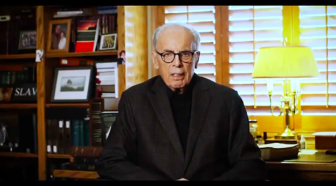
In the aftermath of the shocking and tragic news about Ravi Zacharias's private life, one of our ministry school grads, herself a longtime missionary with her husband, wrote to me, asking, "Would you consider writing something in regards to the Ravi scandals? I know this is sending believers into a whirlwind of confusion."
She continued, "I guess what people are saying is how could a man who sounds so spiritual, lead so many to Jesus, be so deeply involved in wilful sinning? When things like this happen to someone with such influence. It sends people into a whirlwind of doubt."
Many others are asking the identical questions. How, then, should we respond?
1) Anyone can lead a double life. For many years, I have told ministry leaders and ministry school students that it is all too easy to learn to lead a double life. And, on a certain level, all of us learn how to compartmentalize.
Let's say that you're an elementary school teacher dealing with a difficult financial situation that has you on the verge of bankruptcy. This has your attention during every waking moment of your life, except when you're teaching the children. Then, you put on your smiling face, teach your lessons, and act as if you didn't have a care in the world.
Even parents learn to do it in the home, not wanting their children to see fear or anger or some other, negative emotion. We all learn to play-act on some level or another.
Sadly, it's the exact same thing with ministers of the gospel. We learn to play-act too, even in ways that are noble at first.
You're pastoring a church and right before your Sunday sermon, you get terrible news about an old friend who committed suicide. But the cameras are on and you're about to start your live feed and your people need some encouragement, so you ask God for help, you steal yourself, and you preach with passion. Then, afterwards, you break down and cry.
Or you're flying overseas for a major series of meetings and your flights are delayed, meaning that you get off the plane and have to go straight to the first service. You are jet lagged, your body has no idea what time it is, and your brain is fogged. Yet you ask God for grace, and to your amazement, the message hits home.
There was no time to pray, no time to prepare your thoughts, no time even to rest and recover. Yet the Spirit worked through you. Soon enough, this becomes a habit. No prayer. No preparation. Just ministry. You have become a professional – and I mean that in the worst sense of the word. It can happen to anyone.
It's the same with entertaining secret sin in our lives. It may take years, even decades, before that sin catches up to us in a public, outward way. But all the while it is destroying us on the inside. All the while, we are becoming performers, having compartmentalized our lives. There is the public, ministry self and there is the private, hidden self.
The longer this goes on, the harder our hearts become. We become more hypocritical, more polished, more deviant. We not only compartmentalize our sin but we rationalize it. We might even justify it. "I'm a man of God who sacrifices much for the ministry. Surely, I'm allowed some perks along the way!"
In New Testament times, Jesus had severe rebukes for many of the Pharisees. But from what we understand from other, contemporary sources, these men were highly respected religious leaders. Yet to some of them Jesus said, "Woe to you, teachers of the law and Pharisees, you hypocrites! You clean the outside of the cup and dish, but inside they are full of greed and self-indulgence. Blind Pharisee! First clean the inside of the cup and dish, and then the outside also will be clean.
"Woe to you, teachers of the law and Pharisees, you hypocrites! You are like whitewashed tombs, which look beautiful on the outside but on the inside are full of the bones of the dead and everything unclean" (Matthew 23:25-27).
To repeat: this can happen to any of us. That's why all of us should stop for a moment and ask ourselves, "Am I leading a double life?"
The problem is that, for a Christian leader in particular, it is very hard to come clean and ask for help. Even if you are a loving husband who is a blue-collar worker and not a pastor or preacher, would you find it easy to tell your wife you were struggling with porn? Or you were getting pulled into an emotional relationship with a female co-worker?
How much harder is it for a Christian leader to come clean and ask for help? Yet that is what each of us need to do should we find ourselves struggling. Accountability, as painful as it is in the short term, is a God-send in the long term. (We'll return to the subject of accountability later in this article.)
The tragedy is that, if we do not stop and get help, we can lead two very distinct lives, to the point of completely deceiving ourselves. This alone should jar us into reality in the here and now.
2) God's gifts and calling are irrevocable. When Paul wrote these words in Romans 11:29, he was speaking specifically of the nation of Israel. But we can see elsewhere in Scripture that the same principle can apply to individuals.
Sometimes, while reading Judges 16, I have been shaken to the core. There we are told that Samson, whom God gifted with supernatural strength and who had been raised up to deliver Israel from her enemies, slept with a Philistine prostitute. This was an especially heinous act, not only because it was a sexual sin but because it was a sexual sin with Israel's arch enemy.
The text states that when the Philistines came to attack Samson in the middle of the night, "he arose and took hold of the doors of the gate of the city and the two posts, and pulled them up, bar and all, and put them on his shoulders and carried them to the top of the hill that is in front of Hebron" (Judges 16:3).
Can you imagine that? He just had sex with a Philistine prostitute. He is guilty and he is unclean. Yet he still has his supernatural strength. The gift still operates. How sobering, and how terrifying.
Just because someone is anointed doesn't mean they are right with God. Just because someone is gifted by the Spirit doesn't mean they are living holy lives.
That's why we make a giant mistake when we become enamored with someone's gift – be it preaching or be it healing, be it prophecy or be it eloquence. The gift is God's gift. We are responsible for the character of our lives, with His grace and help, of course.
When I first started preaching at the age of 18-years-old, I learned that I could preach on a moment's notice. It is true that I was in the Word day and night and I had a solid prayer life. But there was a preaching gift in me, and the pastor could literally ask me to speak with zero notice, completely unexpectedly, and the Spirit would give me a clear and coherent message on the spot.
I remember one service where the pastor got up to preach, opened his Bible, prayed that God would anoint the message, then turned to me where I was sitting in the front row and said, "Mike, you preach." And I did, with grace and anointing.
Over the years, though, I also realized that the gift still operated even when I wasn't in the Word so much and when I wasn't so prayerful. You can see how dangerous this can get.
To say it again: Do not be enamored by someone's gift.
In charismatic circles, it can be gifts of power that enamor us. In Reformed and non-charismatic circles, it can be gifts of eloquence or learning that enamor us. Instead, let us be careful never to exalt a person because of their gifting, which comes from God. Let us, instead, look at the quality of their life – their character, their interpersonal relationships, their integrity.
When Paul gave Timothy and Titus guidelines for raising up elders (see 1 Timothy 3 and Titus 1), he did not say, "Be sure they are spiritually gifted." Instead, he wrote, "Look at their character, their family, their personal disciplines, and their grounding in the Word."
3) Let God be true and every man a liar. What if you came to faith through Ravi's ministry? What if you were greatly helped by one of his messages? What if he was your go-to guy during times of spiritual and intellectual crisis?
Obviously, right now, it would be very difficult for you to read one of his books or watch one of his videos, and for good reason. But that doesn't mean that the words he spoke were false. And I imagine that as he wrote and spoke, he was quite sincere at those moments, genuinely wanting to help people find the truth. (Again, this is part of the deception of leading a double life.)
The fact is, an atheist can read the Bible out loud, and the words are just as true as if Paul or Peter were reading the words. In the same way, the man who delivers a package to your door can be a miserable husband and father, but that doesn't change the contents of the package.
That's why Paul wrote the words cited here, namely, let God be true and every man a liar (Romans 3:4). In that sense, only the Lord and His Word can have our absolute, total, and perfect trust.
4) Grace can be abused. How many thousands or even millions of times has God forgiven you and me since we came to faith? How many times has He removed any sense of guilt or condemnation? How many times has He reminded us of His great love for us, helping us to focus on His goodness rather than our badness?
It is because of that very grace that the Word gives us strong warnings against abusing grace, including these: "You, my brothers and sisters, were called to be free. But do not use your freedom to indulge the flesh; rather, serve one another humbly in love" (Galatians 5:13). And, "Live as free people, but do not use your freedom as a cover-up for evil; live as God's slaves" (1 Peter 2:16).
That's why Jude wrote, "For certain individuals whose condemnation was written about long ago have secretly slipped in among you. They are ungodly people, who pervert the grace of our God into a license for immorality and deny Jesus Christ our only Sovereign and Lord" (Jude 4).
God's grace empowers us to holiness. Let us not use it as a cloak for immorality. Instead, as those who have been forgiven much, let us love much (see Luke 7:47). Let the Lord's incredible mercy be an incentive to purity rather than an excuse for impurity.
5) The only reason we have this massive scandal is because of lack of accountability and double standards within the ministry. I do not write this to throw stones of accusation (more on that in a moment). I write this because RZIM leaders have confessed to this very thing, admitting that they allowed the father and founder of their ministry to operate with a different set of rules. Had simple accountability been practised, had universal, common-sense standards been applied (such as, you don't travel overseas with your personal, female masseuse), much of this, if not all of it, could have been avoided.
That being said, it's clear that there were warning signs along the way – some of them very loud and obvious, specifically with the complaint from the couple in Canada whom RZIM instead defamed – and had attention been given to these warnings, the situation could have been nipped in the bud.
The truth is that any of us can get beaten down and weakened in the course of our lives and ministries. That's when we need to reach out for help, as well as welcome those who sense that something is wrong and ask us difficult questions.
Those of us who have spouses who seem to have a sixth, detective sense should welcome that too. Better to be uncomfortable in the here and now than to be lost forever.
Godly accountability – in our homes, in the church, in the workplace – is a lifesaver.
6) This is not the time to throw stones; it is time to search our own hearts. RZIM is already taking massive hits, and branches of the ministry worldwide are separating or being renamed. There's no need for us to hurl our own self-righteous stones of accusation at this moment, despite the ministry's past failures in confronting these issues. They are making full confession now, and they acted rightly by calling for a full-scale investigation.
But I, for one, have no desire to pick up a stone of accusation, since on my very best, holiest day, I am still a wretch in the light of God's blazing holiness. What about you? Are you sure you want to pick up a stone?
Maybe we never did what Ravi did, but have we fallen short in other ways? Have we violated God's purity? Have we given place to unholy thoughts? Have we ever crossed dangerous lines, even a little? Have you? Have I?
I suggest you put your stones down and, instead, ask some serious questions. Is there hypocrisy in your own life? Do you have secret, besetting sins? Are you leading a double life yourself? These are the questions I ask myself as well.
To every ministry colleague, I urge you today: If you are struggling with sin in your life, go and get help. Better to humble yourself in private today then to be exposed in public tomorrow.
The fact is that all of us fall short in one way or another. None of us can point a sin-free finger at others without accusing ourselves in the process.
So, get low and get help now rather than wait until the problem explodes.
I truly believe that if we do this quickly and from the heart, God will spare us public shame and reproach. After all, love covers a multitude of sins, and the Lord is jealous for the reputation of His Son.
But if we persist in sin and disobedience, refusing to repent and humble ourselves, the results will be disastrous. As Proverbs 28:13 says, "Whoever conceals his transgressions will not prosper, but he who confesses and forsakes them will obtain mercy." And this, in Proverbs 29:1: "He who is often reproved, yet stiffens his neck, will suddenly be broken beyond healing."
All that being said, we can only imagine how devastating this is for Ravi's family, none of whom can ask questions now or talk with him face to face. Let's remember to pray for them as well.
7) Let's not silence the victims because we want to protect a ministry. It is true that there are many false accusers out there. It is true that there are embittered people who want to bring ministries and leaders down. They are troublemakers and they need to be exposed.
There are also self-deceived people who live in a world of fantasy and imagination, claiming that things happened that never, in fact, did. They should not be allowed to harm the good name of a godly leader. Neither should unfounded, baseless rumors be given any credibility or credence.
But there are also genuine victims, as in the many women against whom Ravi sinned. They must be listened to, no matter what the implications might be. To think that the Lord is more concerned with the success of a ministry than with the wounded person who has been crushed by that ministry is to not know Him at all.
8) To whom much is given, much is required. To the level of gifting or notoriety we have, to that extent are we accountable. All the more does this hold true for those doing public ministry, since we can bring tremendous honor or tremendous reproach to the name of the Lord.
This is a sobering principle for any of us with public ministries or large followings. May we walk worthy of the high calling, may we be quick to deal with sin in our lives, may we practice what we preach, and may we not bring reproach to the name of the Lord or hurt His precious flock.
I would rather die than dishonor Jesus. Yet I also realize that no believer or leader ever intentionally sets out on a course to dishonor His name. That means that we all need to be gripped by a holy fear of the Lord, one that would grant us quick repentance when and if we stray.
9) Sin is never worth it. Ever. The payback is never worth the pleasure, no matter how good the feeling or how powerful the release or how gratifying the moment. Sin always leaves lasting regret. Always.
I have preached on this theme countless times – always preaching to myself as well – focusing on one, key Hebrew word: acharit (pronounced ah-kha-reet; you can listen to the message here). It literally means that which comes after, the final end, and it is found repeatedly in Proverbs.
The message is simple and clear: In the acharit, sin doesn't pay. It will haunt us in this life and drag us down once we're gone – unless we repent and make things right.
That's why Proverbs states, "Listen to counsel and receive instruction so that you may be wise in your acharit" – meaning, wise in your final end (Proverbs 19:20).
None of us are exempt from sin and temptation, and it is those who think they stand who must take heed lest they fall (1 Corinthians 10:12).
My wife, Nancy, sent me these thoughts as I was writing this today: Think of your children, your grandchildren. See their faces as you dangerously toy with sin. What would this do to them? For fathers.....you are your children's hero. We must live as if the entire world is watching....certainly heaven is.
And again, for those who are struggling in a major way, these words of wisdom: Face your sin and GET HELP.
God resists the proud, but He gives grace to the humble.
10) Everything flows out of our personal relationship with the Lord. Nancy also shared these relevant thoughts with me: Take heed lest you fall! Apart from Me, Jesus said, you can do NOTHING...you can't even live a holy life. We must have a living relationship with the Son of God. It is easy to teach the Word without the Spirit (look at the Pharisees). For something like this to take place, we have lost connection with the Head.
Everything in our lives is a direct result of our relationship to the Lord. Is it real, or are we going through the motions? That is a dangerous place in which to remain. Yes there can be times of dryness, but we must push on and go forward. We must have safeguards especially because of the world we live in.
Don't fool yourself. "A little bit of sin can spoil a whole life" (Smith Wigglesworth). We don't really get away with anything. If we dabble with sin long enough, it will come back to bite us and even destroy us, as well as cause grief and harm to those around us.
It is a life that has strayed from God that gets plunged into a base and secret life. There is no other way for this to happen. It does not just appear in one day but is a slow methodical process of yielding to our flesh and then sin. Which direction is your life going? Are you moving forward in God? We MUST be moving forward.
There will be temptations (Jesus was tempted), but God gives us a way of escape if we truly want it (a leader, a friend, the Word, safeguards etc.). If there is constant overwhelming temptation, we are in a bad place and should get help from a godly, trusted leader.
There is an old saying that either sin will keep you from prayer (or, from the Word) or prayer (or the Word) will keep you from sin.
If we are in true, vibrant, daily, vital fellowship with the Lord through His Word and prayer, we will not lead a double life.
11) Don't become jaded, as if no leaders can be trusted. Again, we make a mistake if we look to a person – any person – in the same way that we look to the Lord. But there are many God-fearing leaders, people of integrity, people who are not living double lives.
In that context, Nancy also wrote this: It is right and correct to expect our leaders to live holy lives...to live in purity and to be godly examples...ESPECIALLY in their private lives. It should not be the extra holy ones whole live an exemplary life. God expects no less from us. But we cannot do it by mere will. It is only our close relationship with the Lord whom we love that will keep us free from a life of sin.
If there is a ministry you support from a distance, feel free to ask them questions about standards and accountability. Those who are clean are glad to bring relevant information into the light.
If there is a church or ministry you work with locally, do your best to get to know your leaders personally. Spend time with them if you can. Get to know their families. Join them, if invited, on ministry trips. While you will have some disappointments along the way, you will also meet many fine people, people worthy of your respect.
12) A massive apology is owed to those who do not believe our gospel message. If you are reading this as a non-believer – as an atheist or agnostic or member of another faith or as a former Christian – then as a public ministry leader, I want to apologize to you from the heart.
What Ravi did was absolutely inexcusable, and it is no way reflective of our values and beliefs. To the contrary, the whole reason that there is such shock and dismay around the world is because this is so abhorrent to us.
If sexual immorality and hypocrisy were our way of life, there would be no shock at all. Instead, there would be a yawn. But there are no yawns in our midst over this terrible news. Instead, there are tears and sobs and cries of grief and shock.
This is the opposite of who we are in Jesus, the opposite of the standards that He set, the opposite of the way we seek to conduct our lives.
Our God opposes this rather than condones it, and so, to each of you who says, "We expected better of you," I say in response: You had every reason to expect something better. Please continue to expect higher standards from us. By God's grace, we will show you that tragic cases like this are the exception to the rule. And even if Ravi's life was not true, his message about God was true.
The bottom line is that these moral failings are ours and ours alone. They do not reflect in the least on the character of our God.
Instead, it is His light that exposes the darkness. But He doesn't leave us there. He also sent His Son to die for these very sins. He will have mercy on you if you look to Him as well.
13) Let us live sober lives today in light of the great accounting tomorrow. Paul wrote that all of us, as believers, will give account to God one day (see Romans 14:12 and 2 Corinthians 5:10).
He also warned that Satan himself could come like an angel of light. How much more Satan's servants (see 2 Corinthians 11:13-15).
Jesus also warned about false prophets who were wolves in sheep's clothing, saying that we would know them by their fruit (see Matthew 7:15-20).
The Lord also said this, "Not everyone who says to Me, 'Lord, Lord,' will enter the kingdom of heaven, but only the one who does the will of my Father who is in heaven. Many will say to Me on that day, 'Lord, Lord, did we not prophesy in your name and in your name drive out demons and in your name perform many miracles?' Then I will tell them plainly, 'I never knew you. Away from me, you evildoers!'" (Matthew 7:21-23)
I truly hope that Ravi made things right with the Lord before he died, and, although I never knew him personally, I believe that he truly wanted to make Jesus known. Tragically, he failed to humble himself and get the help that he needed while he was alive, now bringing tremendous reproach to the name of the Lord, hurting millions in their faith, and leaving a trail of victims behind.
May all of us take stock today of our lives. And may we, with God's help and grace, redouble our efforts to make Jesus known in all of His beauty and power.
He deserves nothing less than this, and for that, as a leader in the Body of Christ, I say, "Lord, I am so sorry we have done this to You, dishonoring You before a watching world. By Your grace, we will bring you great honor and glory in the days to come, beginning with our own individual repentance where it is needed.
"May Your name be hallowed! May Your kingdom come. May Your will be done on earth as it is in heaven – even through each of us."
And let all of God's people say, "Amen."
Dr. Michael Brown (www.askdrbrown.org) is the host of the nationally syndicated Line of Fire radio program. His latest book is Jezebel's War With America: The Plot to Destroy Our Country and What We Can Do to Turn the Tide. Connect with him on Facebook, Twitter, or YouTube.







